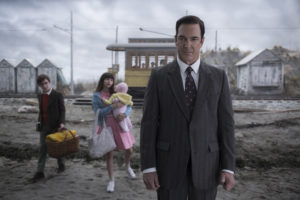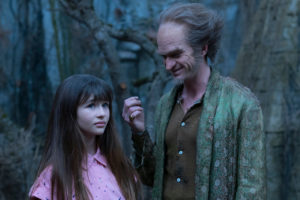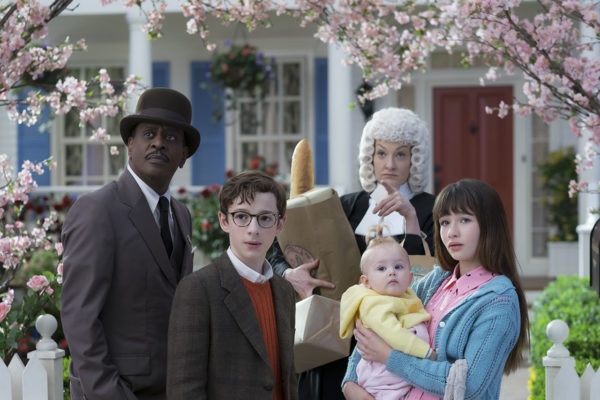 This post, regarding the Netflix Original “A Series of Unfortunate Events,” will be dreadful, melancholy, and “calamitous,” a word which here means “dreadful and melancholy.” That is because not many happy things happened in the lives of the children of Adam.
This post, regarding the Netflix Original “A Series of Unfortunate Events,” will be dreadful, melancholy, and “calamitous,” a word which here means “dreadful and melancholy.” That is because not many happy things happened in the lives of the children of Adam.
Patrick Warburton’s “Lemony Snicket” goes out of his way to warn you off of A Series of Unfortunate Events. In TV ads as well as the first minutes of each episode, he reminds you that the lives of the Baudelaires is a tragic one. The title theme repeatedly advises you to “look away, look away.”
But if you did, you’d miss a delightfully heartbreaking show that embraces loss in a unique, beautiful, Gothic way. You’d miss the expectant purpose of Violet, Klaus, and Sunny. You’d miss the weight and import of mourning with those who mourn. And you’d miss a lovable exploration of what “tragedy” really is.
A Descent into Misery, Tribulation, and Dire Inconvenience
 Tragedy is a funny thing. It does live beside “comedy” as one of the two classical forms of narrative: the sad story, as opposed to the happy one. And it’s a feeling we all face at some time or another. But for something so crucial to the lives of humans, we seem to try and ignore it a lot.
Tragedy is a funny thing. It does live beside “comedy” as one of the two classical forms of narrative: the sad story, as opposed to the happy one. And it’s a feeling we all face at some time or another. But for something so crucial to the lives of humans, we seem to try and ignore it a lot.
Thankfully, A Series of Unfortunate Events doesn’t coddle us. Lemony Snicket forces us to face up to loss; to deal with it in what I’d say is a rather Christian way. It’s tender, but not mopey; it’s joyful, but not flippant. It doesn’t succumb to that “shiny happy people” stereotype that pervades not only children’s media, but Christian culture as well; the idea that everything has to be cute, fun, and light. Or at least “inspirational,” whatever that means.
What a stupid idea. People suffer loss. In painful ways that sometimes seem to have no meaning behind them. The series gives us the opportunity to examine loss in an intimate (but also quirky and humorous) way. It lets us come to grips with the fact that loss is real, and sometimes it affects people in tougher ways than we can imagine.
But the show also offers us a crucial way to look at tragedy; to remember that life doesn’t end with loss, but sometimes it does begin there. It can give a dramatically different sense of expectant purpose.
Carpe diem – Seize the Children!
 The Baudelaires are already fairly independent even before the titular Unfortunate Events begin. They are self-sufficient and clever, with a desire to make and solve things; traits that serve them well when their parents die. But when tragedy strikes, they get a sudden depth of purpose they never had before: to stick together and survive, and to discover what happened to their home. It’s not just a reason for living, it’s expectant purpose: a word which here means “a reason for living and so much more.”
The Baudelaires are already fairly independent even before the titular Unfortunate Events begin. They are self-sufficient and clever, with a desire to make and solve things; traits that serve them well when their parents die. But when tragedy strikes, they get a sudden depth of purpose they never had before: to stick together and survive, and to discover what happened to their home. It’s not just a reason for living, it’s expectant purpose: a word which here means “a reason for living and so much more.”
What is expectant purpose?
- It’s expectant. Obviously. It’s a mindset that presumes there will be an answer and earnestly seeks it.
- It’s purposeful. Again, duh. Expectant purpose has a goal in mind, and tries to get to it.
- It’s fueled by love and driven by wonder. Expectant purpose seeks the best for those we love and beauty in the meantime.
All of this is summed up in Jeremiah 29:11 – which you may have heard (probably on a mug or a t-shirt):
For I know the plans I have for you, declares the LORD, plans for welfare and not for evil, to give you a future and a hope.
-Jeremiah 29:11, ESV
This verse was not written for extra comfort in easy times. It was written for consolation in tragedy, loss, and exile. It was written to the nation of Israel who had lost their home, many of their people, their freedom, and even their very identity when they were conquered and enslaved – and the worst part is that, unlike the Baudelaire orphans, it was their fault. Still, God did not just pat them on the head. He gave them expectant purpose.
The story of the Baudelaires is not over yet (at least on Netflix), so we don’t yet really know what their purpose is. But we do know that the purpose of the nation of Israel was to be a blessing to the nations – an expectant purpose which now falls to you, Christian.
All good, true, and decent people know that it’s time to volunteer
But how? What sort of blessing are you to be?
The job of the Christian boils down to one thing:
Religion that is pure and undefiled before God the Father is this: to visit orphans and widows in their affliction, and to keep oneself unstained from the world.
James 1:27, ESV
 “Pure and undefiled” are words which here mean “unadulterated, everlasting, and beautiful, like a shiny crown of solid gold.” So the religion that God finds beautiful is to single-mindedly care for those in need, to the point where there’s no more room for sin. Put more simply, God wants us to be like Jesus.
“Pure and undefiled” are words which here mean “unadulterated, everlasting, and beautiful, like a shiny crown of solid gold.” So the religion that God finds beautiful is to single-mindedly care for those in need, to the point where there’s no more room for sin. Put more simply, God wants us to be like Jesus.
We’re cleansed through being sanctified from our sin by the Holy Spirit; by running from it and seeking to kill it when it rears its deadly head. But even more so by so filling our lives with good that there’s no room for the sin; being kind, generous, loving, and by weeping with those who weep.
The plight of the Baudelaires made me want to sit with them and listen. My heart broke whenever they were brushed off by an adult, or whenever someone failed to listen to them appropriately. In fact, I’d say most of the Unfortunate Events happened because an adult didn’t take the time to listen to the children.
Mourning and tragedy are a call to empathize, to sit with others, and to listen while they experience their grief. To help where you can, but even more so to listen.
We’re saved to be a blessing, and this is how.
I’m sorry to tell you this
If you’re a Christian, your life may or may not be a series of unfortunate events, but it did begin with a tragedy: the death of Jesus on the Cross. So we should understand loss and tragedy; our faith was forged in it.
And, yes, our story does get better at the end; Jesus did rise from the dead, conquering sin and death so that we could volunteer and stand alongside others. He did ascend to heaven, and does intercede for us. But all of that is in the future: today, be a blessing to those in need, and live in expectant purpose. Because grief is real, and Jesus redeemed us to give us a calling (a word which here means “a big, daunting job that we can only do with help”).

• • •
This article originally appeared on RedeemingCulture.com.
